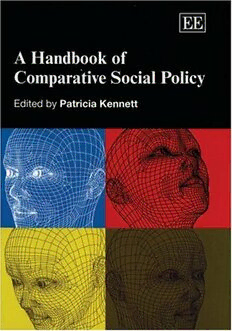Download A handbook of comparative social policy PDF Free - Full Version
Download A handbook of comparative social policy by Patricia Kennett in PDF format completely FREE. No registration required, no payment needed. Get instant access to this valuable resource on PDFdrive.to!
About A handbook of comparative social policy
The current context of social policy is one in which many of the old certainties of the past have been eroded. The predominantly inward-looking, domestic preoccupation of social policy has made way for a more integrated, international and outward approach to analysis which looks beyond the boundaries of the state. It is in this context that this handbook brings together the work of key commentators in the field of comparative analysis in order to provide comprehensive coverage of contemporary debates and issues in cross-national social policy research. Organised around five themes, this impressive volume explores the contextual, conceptual, analytical and processual aspects of undertaking comparative social research. In the first part, the authors are concerned with de-centring the state and extending the epistemological framework through which cross-national analysis is explored. In Parts II and III, the focus is on the conceptual and theoretical frameworks for analysing social policy cross-nationally, while Part IV examines the day-to-day reality of preparing for and carrying out cross-national analysis. In the final section, the authors highlight continuing and emerging themes and issues which are of particular relevance to understanding the contemporary social world. International in scope, this authoritative Handbook presents original cutting edge research from leading specialists and will become an indispensable source of reference for anyone interested in comparative social research. It will also prove a valuable study aid for undergraduate and postgraduate students from a range of disciplines including social policy, sociology, politics, urban studies and public policy.
Detailed Information
| Author: | Patricia Kennett |
|---|---|
| Publication Year: | 2004 |
| ISBN: | 1840648864 |
| Pages: | 439 |
| Language: | English |
| File Size: | 2.541 |
| Format: | |
| Price: | FREE |
Safe & Secure Download - No registration required
Why Choose PDFdrive for Your Free A handbook of comparative social policy Download?
- 100% Free: No hidden fees or subscriptions required for one book every day.
- No Registration: Immediate access is available without creating accounts for one book every day.
- Safe and Secure: Clean downloads without malware or viruses
- Multiple Formats: PDF, MOBI, Mpub,... optimized for all devices
- Educational Resource: Supporting knowledge sharing and learning
Frequently Asked Questions
Is it really free to download A handbook of comparative social policy PDF?
Yes, on https://PDFdrive.to you can download A handbook of comparative social policy by Patricia Kennett completely free. We don't require any payment, subscription, or registration to access this PDF file. For 3 books every day.
How can I read A handbook of comparative social policy on my mobile device?
After downloading A handbook of comparative social policy PDF, you can open it with any PDF reader app on your phone or tablet. We recommend using Adobe Acrobat Reader, Apple Books, or Google Play Books for the best reading experience.
Is this the full version of A handbook of comparative social policy?
Yes, this is the complete PDF version of A handbook of comparative social policy by Patricia Kennett. You will be able to read the entire content as in the printed version without missing any pages.
Is it legal to download A handbook of comparative social policy PDF for free?
https://PDFdrive.to provides links to free educational resources available online. We do not store any files on our servers. Please be aware of copyright laws in your country before downloading.
The materials shared are intended for research, educational, and personal use in accordance with fair use principles.

